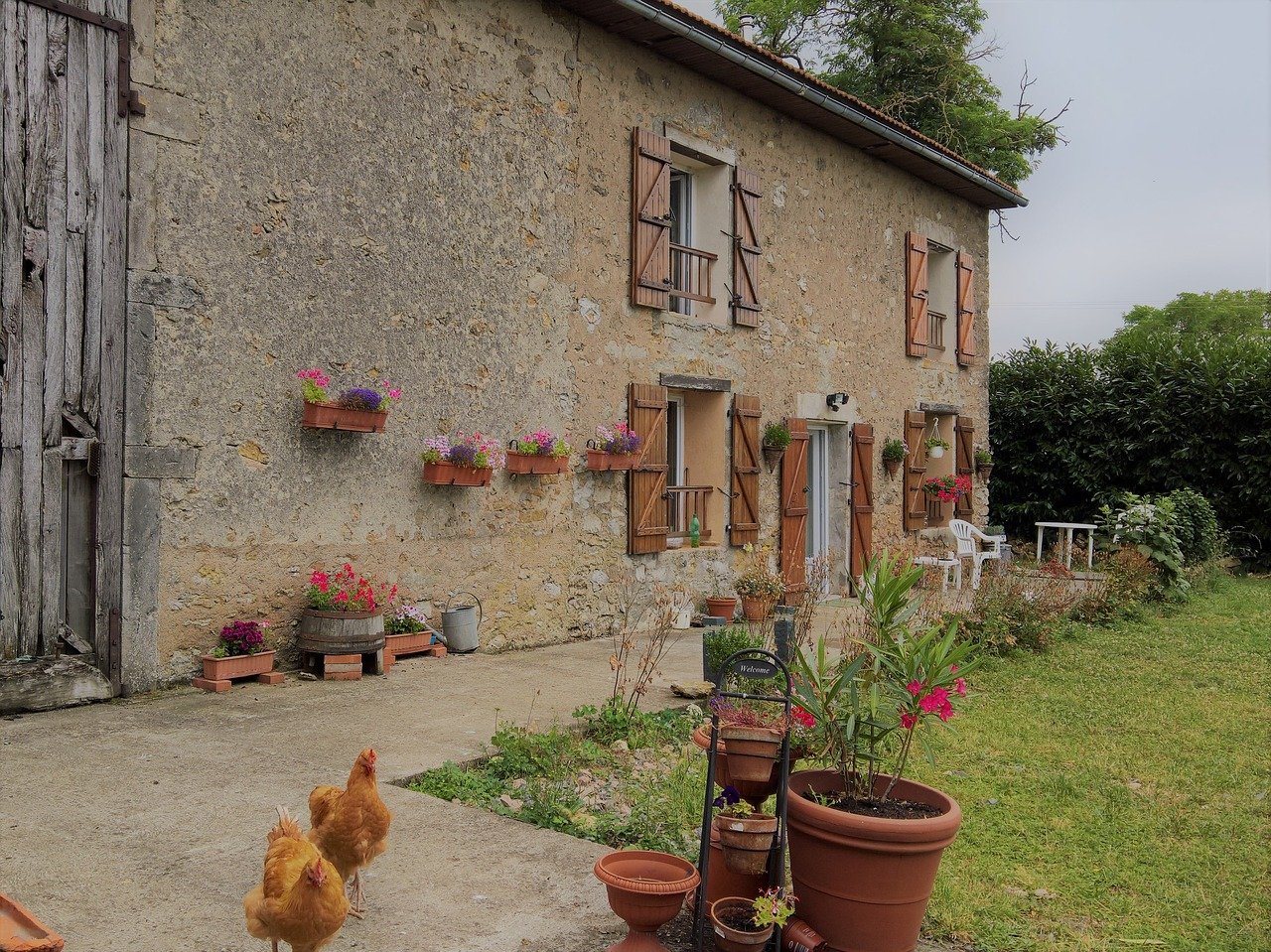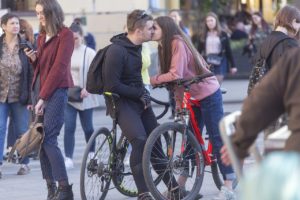Avez-vous des animaux domestiques ? Do you have any pets?
People keep all sorts of animals as pets, but the most common ones are un chien a dog, un chat a cat, un poisson rouge a goldfish, une perruche a parakeet, un perroquet a parrot, un hamster a hamster. Two animals that aren’t usually pets but that you can often find in or around buildings are: une souris a mouse, un rat a rat.
- Nous avons un chien et un chat.
We have a dog and a cat. - Comment s’appelle votre chien/chat ?
What’s your dog’s/cat’s name? - Je joue avec mon chiot.
I’m playing with my puppy.
- Je caresse notre chaton.
I’m petting our kitten. - Est-ce que votre chien mord ?
Does your dog bite? - Est-ce que votre chat griffe ?
Does your cat scratch? - J’ai un poisson rouge dans un bocal.
I have a goldfish in a fishbowl. - J’ai beaucoup de poissons dans un aquarium.
I have a lot of fish in an aquarium. - Nous avons deux hamsters dans une cage.
We have two hamsters in a cage. - Mon perroquet parle beaucoup.
My parrot talks a lot. - J’ai crié quand j’ai vu une souris.
I screamed when I saw a mouse. - Ce n’est pas une souris, c’est un rat !
That’s not a mouse, it’s a rat!
Quel est le cri du chien ? What sound does a dog make?
In English, dogs say “woof” and cats say “meow,” but of course that’s all different in French.
- Les chiens aboient. Un chien fait « wouf wouf ! »
Dogs bark. A dog says “Woof!” - Les chats miaulent. Un chat fait « miaou ! »
Cats meow. A cat says “Meow!” - Les oiseaux gazouillent. Un oiseau fait « cui-cui ! »
Birds chirp. A bird says “Tweet!” - Les vaches meuglent. Une vache fait « meuh. »
Cows moo. A cow says “moo.” - Les coqs chantent. Un coq fait « cocorico ! »
Roosters crow. A rooster says “cock-a-doodle-do.” - Les canards cancanent. Un canard fait « coin-coin. »
Ducks quack. A duck says “quack.” - Les cochons couinent. Un cochon fait « grouin grouin. »
Pigs squeal. A pig says “oink oink.” - Les chiens grognent quand ils sont fâchés.
Dogs growl when they’re angry. - Les chats ronronnent quand ils sont contents.
Cats purr when they’re happy.
À la Ferme: On the Farm
The most usual animals on a farm are: un cheval (des chevaux) a horse (horses), une vache a cow, un taureau a bull, un cochon a pig, un mouton a sheep, un poulet a chicken, une oie a goose, une chèvre a goat, un âne a donkey.
- Le cheval galope dans le pré/champ.
The horse is running in the pasture. - Les vaches sont dans la grange.
The cows are in the barn. - Les cochons sont couchés dans la boue.
The pigs are lying in the mud. - Les poules sont dans le poulailler.
The chickens are in the coop. - Le fermier/la fermière trait les vaches.
The farmer milks the cows. - Les poules pondent des œufs.
Chickens lay eggs. - La laine vient des moutons.
Wool comes from sheep.
Some other words related to animals that you want to know are: la fourrure fur, les écailles (f.) scales, la queue tail, le sabot hoof, la corne horn, la plume feather, la crinièremane, la griffe claw.
- Le cheval a une belle crinière.
The horse has a beautiful mane. - L’oie a des plumes blanches.
The goose has white feathers. - Les taureaux ont des cornes.
Bulls have horns. - Le cochon a une petite queue.
The pig has a little tail. - Quels animaux ont des sabots ?
Which animals have hooves? - Fais/Faites attention ! Le chat a des griffes pointues.
Be careful! The cat has sharp claws.
Les Oiseaux: Birds
Here’s some vocabulary for our feathered friends: un oiseau a bird, un canard a duck, un aigle an eagle, un faucon a hawk, un pigeon a pigeon, une dinde a turkey, un paon a peacock, un cygne a swan, un hibou/une chouette an owl, une mouette a seagull.
- Entends-tu les oiseaux ?
Do you hear the birds? - Il y a des canards à côté du lac.
There are some ducks next to the lake. - Les aigles volent très haut.
Eagles fly very high. - Les paons ont un beau plumage.
Peacocks have beautiful feathers. - Il y a beaucoup de pigeons dans le parc.
There are a lot of pigeons in the park. - Les cygnes sont des animaux très élégants/gracieux.
Swans are very elegant animals. - Une chouette hulule dans les bois.
An owl is hooting in the woods. - Les mouettes volent au-dessus de la plage.
The seagulls are flying over the beach.
Les Animaux Sauvages: Wild Animals
The most common wild animals around the world are these: un cerf/une biche a deer, un ours a bear, un loup a wolf, un renard a fox, un coyote a coyote, un raton laveur a raccoon, un écureuil a squirrel, un lapin a rabbit, une chauve-souris a bat, un serpent a snake, un lézard a lizard.
- Les cerfs broutent de l’herbe dans le champ/pré.
The deer are eating grass in the field. - Un renard courait dans les bois.
A fox ran into the woods. - Nous avons vu un ours quand nous faisions une randonnée.
We saw a bear when we were hiking. - Les loups hurlent à la lune.
Wolves howl at night. - Les écureuils grimpent les arbres très rapidement.
Squirrels climb trees very quickly. - Y a-t-il des ratons laveurs (par) ici ?
Are there raccoons here? - Les chauves-souris sortent après le coucher de soleil.
Bats come out after sunset. - Fais/Faites attention ! Il y a un serpent sur le chemin.
Be careful! There’s a snake on the path.
Au Zoo: At the Zoo
Depending on where you live, you may not need to go to a zoo to see these animals. But for most of us, a zoo is the only place where we’ll see: un éléphant an elephant, un lion a lion, un tigre a tiger, une giraffe a giraffe, un zèbre a zebra, un rhinocéros a rhinoceros, un singe a monkey, un gorille a gorilla, un hippopotame a hippopotamus.
- Les éléphants ont des trompes et de longues défenses.
Elephants have trunks and long tusks. - Les lions rugissent et grognent.
Lions roar and snarl. - Les tigres ont des rayures.
Tigers have stripes. - Les giraffes ont de très longs cous.
Giraffes have very long necks. - Les zèbres ont des rayures noires et blanches.
Zebras have black and white stripes. - Les rhinocéros ont de très grosses cornes.
Rhinos have very big horns. - Les singes passent beaucoup de temps dans les arbres.
Monkeys spend a lot of time in trees. - Les gorilles sont très semblables aux gens.
Gorillas are very similar to people. - Les hippopotames courent très vite !
Hippos run very fast!
Dans l’Eau: In the Water
If you live near a lake or river, you may see some of these: un poisson a fish, une grenouille a frog, une tortue a turtle, un castor a beaver, un escargot a snail, un alligator an alligator, un crocodile a crocodile.
- Quel type de poisson vit dans ce lac ?
What kind of fish live in this lake? - Il y a une tortue sur cette pierre.
There’s a turtle on that rock. - On entend les grenouilles la nuit en été.
We hear frogs at night in the summer. - Les escargots se déplacent très, très lentement.
Snails move very, very slowly. - Les castors rongent les arbres et font des barrages.
Beavers chew trees and make dams. - Est-ce un alligator ou un crocodile ?
Is that an alligator or a crocodile?
In the ocean, you may see: un requin a shark, une baleine a whale, un dauphin a dolphin, un crabe a crab, un homard a lobster, une méduse a jellyfish, une étoile de mer a starfish, un oursin a sea urchin, une anguille an eel, une palourde a clam, une moule a mussel, une crevette a shrimp, une pieuvre / un poulpe an octopus, un calmar a squid.
- J’ai peur des requins, alors je ne nage pas dans l’océan !
I’m afraid of sharks, so I don’t swim in the ocean! - Nous avons vu des dauphins nager près de la plage.
We saw dolphins swimming near the beach. - Nous ne baignons pas aujourd’hui. Il y a trop de méduses.
We’re not swimming today. There are too many jellyfish. - Nous avons trouvé une étoile de mer sur la plage.
We found a starfish on the beach. - Aïe ! J’ai marché sur un oursin. Ça fait mal !
Ouch! I stepped on a sea urchin. That’s painful! - Il y a beaucoup de crabes près de ces rochers.
There are a lot of crabs near those rocks. - Les palourdes vivent dans le sable.
Clams live in the sand. - Les moules vivent sur les rochers.
Mussels live on rocks.
Insectes et Autres Petites Créatures: Insects and Other Small Creatures
If you every need to talk about insects, bugs, or other creep-crawlies, you will need to know these: un insecte/une petite bête a bug, une araignée a spider, une fourmi an ant, une abeille a bee, un scarabée a beetle, une coccinelle a ladybug, une mouche a fly, un moustique a mosquito, un papillon a butterfly, un papillon de nuit a moth, un ver de terre a worm, un scorpion a scorpion.
- Je n’aime pas les insectes !
I don’t like bugs! - Il y a une grosse araignée qui rampe sur le mur de ma chambre !
There’s a big spider crawling on the wall in my bedroom! - Les moustiques me piquent ce soir.
The mosquitos are biting me tonight. - J’ai été piqué par une guêpe !
I was stung by a wasp! - Les papillons sont beaux et pleins de couleurs.
Butterflies are beautiful and colorful. - Les papillons de nuit sont attirés par la lumière.
Moths fly around lights at night. - Les vers de terre vivent dans la terre.
Worms live in the soil. - Les coccinelles sont noires et rouges.
Ladybugs are black and red. - Fais/Faites attention ! Il y a des scorpions par ici.
Be careful! There are scorpions around here.
Do you want to learn French?
Check out our other posts on French language, culture, and more. And if you’re looking for convenient and affordable live French lessons with a real teacher, check out The Language Garage. Our lessons are given online in a virtual classroom, so it doesn’t matter where you live or work. We can come to you. And we have flexible options, with a free trial so that you can decide if there’s a fit. Check us out!
Free Student Book and Audio
You can access our original student book and practice audio here. If you’d like to use it with an instructor, you can enroll in lessons. Or you can use it on your own as self-study, totally free.
Image by sangojsango from Pixabay




